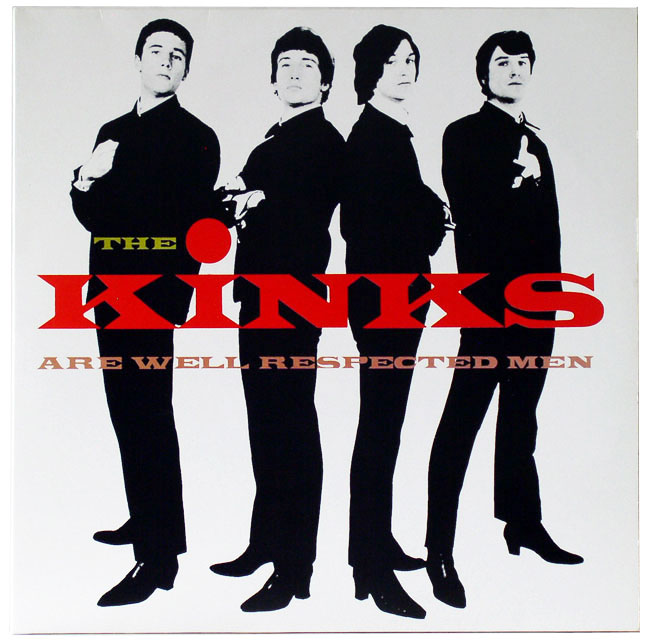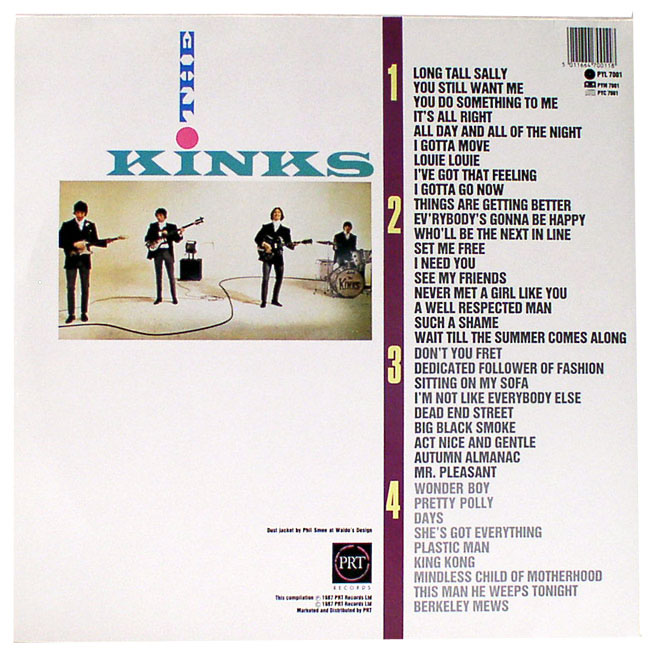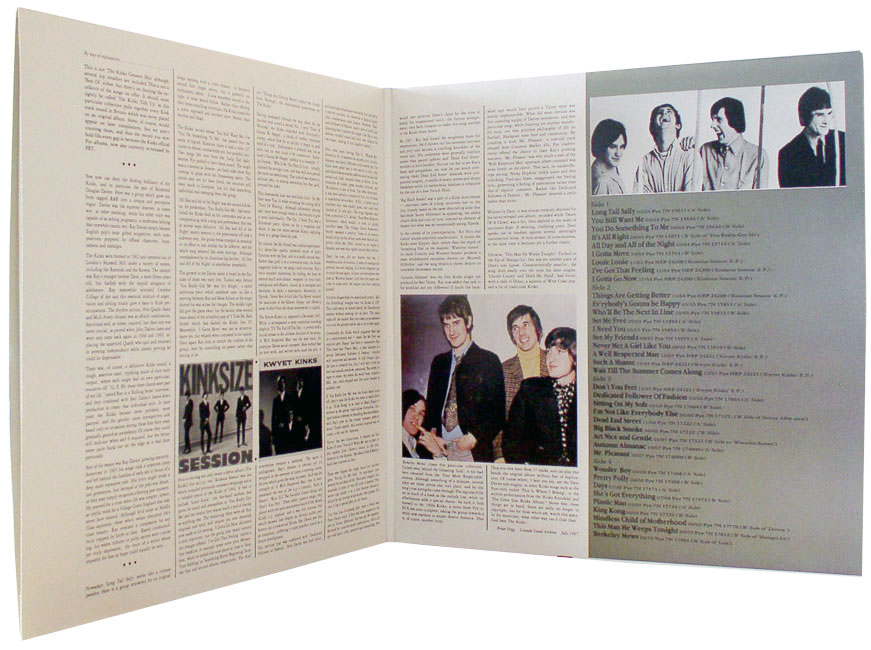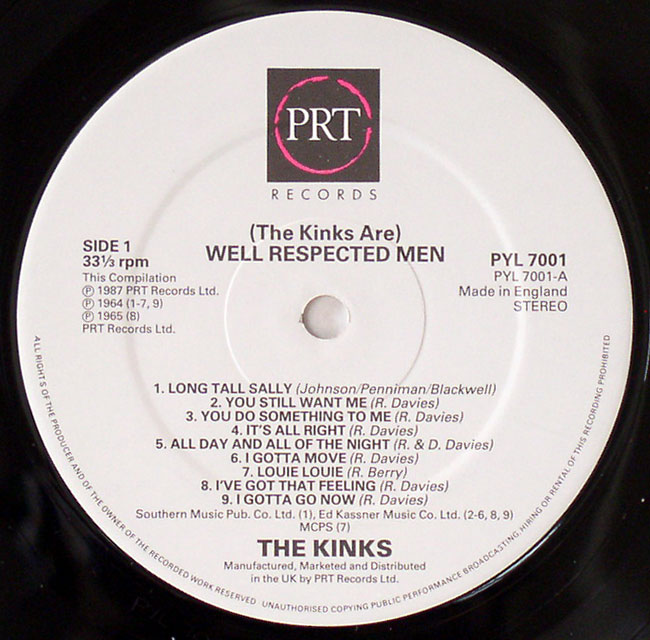The Kinks Are Well Respected Men
Tracks:
| Side 1 | ||
| 1. Long Tall Sally | mono mix (2:10), recorded probably 17 Jan, 1964 at Pye Studios (No .1), London | |
| 2. You Still Want Me | mono mix (1:58), recorded probably 17 Jan, 1964 at Pye Studios (No. 1), London | |
| 3. You Do Something To Me | mono mix (2:23), recorded probably 17 Jan, 1964 at Pye Studios (No. 1), London | |
| 4. It's Alright | mono mix (2:35), recorded mid-Jun, 1964 at Pye Studios (No. 2), London | |
| 5. All Day And All Of The Night | mono mix (2:20), recorded 24 Sep, 1964 at Pye Studios (No. 2), London | |
| 6. I Gotta Move | mono mix (2:24), recorded 17, 18, 24, 25 Aug 1964 at Pye Studios (No. 2), London | |
| 7. Louie Louie | mono mix (2:57), recorded 18 Oct, 1964 at Pye Studios (No. 2), London | |
| 8. I've Got That Feeling | mono mix (2:45), recorded 18 Oct, 1964 at Pye Studios (No. 2), London | |
| 9. I Gotta Go Now | mono mix (2:54), recorded 24 Sep, 1964 at Pye Studios (No. 2), London | |
| Side 2 | ||
| 1. Things Are Getting Better | mono mix (1:57), recorded 18 Oct, 1964 at Pye Studios (No. 2), London | |
| 2. Ev'rybody's Gonna Be Happy | mono mix (2:14), recorded 22 Dec, 1964 at Pye Studios (No. 2), London | |
| 3. Who'll Be The Next In Line | mono mix (2:00), recorded 23 Dec, 1964 at Pye Studios (No. 2), London | |
| 4. See My Friends | mono mix (2:44), recorded 3 May, 1965 at Pye Studios (No. 1), London | |
| 5. I Need You | mono mix (2:24), recorded 14 Apr, 1965 at Pye Studios (No. 1), London | |
| 6. Set Me Free | mono mix (2:10), recorded 14 Apr, 1965 at Pye Studios (No. 1), London | |
| 7. Never Met A Girl Like You Before | mono mix (2:03), recorded 14 Apr, 1965 at Pye Studios (No. 2), London | |
| 8. A Well Respected Man | mono mix (2:38), recorded probably 6 Aug, 1965 at Pye Studios (No. 2), London | |
| 9. Such A Shame | mono mix (2:17), recorded probably 14 Apr, 1965 at Pye Studios (No. 2), London | |
| 10. Wait Till The Summer Comes Along | mono mix (2:06), recorded probably 3 May, 1965 at Pye Studios (No. 2), London | |
| Side 3 | ||
| 1. Don't You Fret | mono mix (2:41), recorded probably 6 Aug, 1965 at Pye Studios (No. 2), London | |
| 2. Dedicated Follower Of Fashion | mono mix (2:59), recorded 7 Feb, 1966 at Pye Studios (No. 2), London | |
| 3. Sitting On My Sofa | mono mix (3:03), recorded 29, 30 Dec, 1965 at Pye Studios (No. 2), London | |
| 4. I'm Not Like Everybody Else | mono mix (3:29), recorded probably Jan 1966 at Pye Studios (No. 2), London | |
| 5. Dead End Street | mono mix (3:20), recorded probably 22 Oct, 1966 at Pye Studios (No. 2), London | |
| 6. Big Black Smoke | mono mix (2:32), recorded probably 21 Oct, 1966 at Pye Studios (No. 2), London | |
| 7. Act Nice & Gentle | mono mix (2:39), recorded probably Jan 1967 at Pye Studios (No. 2), London | |
| 8. Autumn Almanac | mono mix (3:10), recorded Sep 1967 at Pye Studios (No. 2), London | |
| 9. Mr. Pleasant | mono mix (3:00), recorded Mar 1967 at Pye Studios (No. 2), London | |
| Side 4 | ||
| 1. Wonderboy | mono mix (2:48), recorded Mar 1968 at Pye Studios (No. 2), London | |
| 2. Polly | mono mix (2:49), recorded Mar 1967 at Pye Studios (No. 2), London | |
| 3. Days | mono mix (2:52), recorded May 1968 at Pye Studios (No. 2), London | |
| 4. She's Got Everything | mono mix (3:08), recorded 7 Feb, 1966 at Pye Studios (No. 2), London | |
| 5. Plastic Man | mono mix (3:00), recorded Mar 1969 at Pye Studios (No. 2), London | |
| 6. King Kong | mono mix (3:21), recorded early Mar 1969 at Pye Studios (No. 2), London | |
| 7. Mindless Child Of Motherhood | mono mix (3:13), recorded May 1969 at Pye Studios (No. 2), London | |
| 8. This Man He Weeps Tonight | mono mix (2:41), recorded Jan 1969 at Pye Studios (No. 2), London | |
| 9. Berkeley Mews | mono mix (2:37), recorded probably Spring 1968 at Pye Studios (No. 2), London | |
Liner Notes:
By way of explanation...This is not 'The Kinks Greatest Hits' although several top smashes are included. This is not a 'Best Of', either, but there's no denying the excellence of the songs on offer. It should more rightly be called 'The Kinks Tidy Up' as this particular collection pulls together every Kink track issued in Britain which was never placed on an original album. Some. of course, would appear on later compilations, but we aren't counting those, and thus the record you now hold fills every gap in between the Kinks official Pye albums, now also currently re-released by PRT.
* * *
Few now can deny the shining brilliance of the Kinks, and in particular the pen of Raymond Douglas Davies. Here was a group which grew out from ragged R&B into a unique and perceptlve vogue. Davies was the supreme observer, at times wry, at other mocking, while his other voice was capable of an aching poignancy, a tenderness belying what erstwhile caustic wit. Rav Davies simply became English pop's most gifted songwriter, with compositions peppered by offbeat characters, hope, sadness and nostalgia.
The Kinks were formed in 1962 and operated out of London's Muswell Hill under a variety ot names, including the Ramrods and the Ravens. The catalyst was Ray's younger brother Dave, a mere fifteen years old, but fuelled with the impish arrogance of adolesence. Ray meanwhile attended Croydon College of Art and this essential mixture of anger, vision and sibling rivalry gave a basis to Kink preoccupations. The rhythm section, Pete Quaife (bass) and Mick Avory (drums) was an affable combination, functional and, at times, inspired, but their role was never crucial, as proved when John Dalton came and went and came back again in 1966 and 1969, replacing the unsettled Quaife who quit and returned in seeming independence while merely proving he could be dispensable.
There was, of course, a definitive Kinks sound; a tough, assertive snarl, typifying much of their early output, where each single had its own particular, evocative riff. "G, F, Bb; those three chords were part of my life," stated Ray in a 'Rolling Stone' interview, and they combined with Shel Talmy's bared-down production to create that individual style. In later years the Kinks became more polished, more pastoral, and the gentler, more introspective side heard only on occasions during those first fiery years gradually gained an ascendancy. Of course they could still rock-out when and if required, but the frenzy never quite hung out on the edge as it had done prevlously.
Part of the reason was Rav Davies' growing maturity. Sometime in 1965 his songs took a quantum jump and left behind the fumbles of early sex in favour of a deep more expansive role. His Iyrics might evoke a lost generation, but betraval of the post-war dream or they may simply recapture a fleeting past moment. He yearned for a time when life was simpler, slower; an idyllic wish for a Village Green England that may never have existed. Although he'd snipe at Middle Class aspirants; those who's values obscurred life's truer beauty, Ray retained a compassion for any truly trapped by birth or class. Rarely condescend ing, his warm trlbutes or pithv satires were concise yet truly expressive, the voice of a writer whose empathy for loss or hope could equally be seen.
* * *
Nowadays 'Long Tall Sally' seems like a curious paradox. Here is a group renowned for its original songs opening with a cover version. It betrayed several first single nerves, but is generally an enthusiastic debut, if now somewhat muted in the light of whar vould follow. Rather than otfering their bone-crushing technique, the Kinks aimed for a softer approach and sounded more Mersey than rhythm and blues.
The Kinks' second release 'You Still Want Me' c/w 'You Do Something To Me', has passed into the realm of legend. Rumours claim it sold a mere 127 copies on release, uncharitable yes, but possibly true. Two songs left over from the 'Long Tall Sally' session, Pye pushed to have them issued. The single was a commercial disaster, yet both sides show Ray coming to grips with his blossoming talent. The pieces may not yet have fitted, the structure still owes much to Liverpool, but it's clear something individual was emerging from the group.
'All Day and All of the Night' was the natural follow up. Its predecessor, 'You Really Got Me', had established the Kinks both as hit contenders and as uncompromising with a song and performance that was in several ways definitive. 'All Day and All of the Night' merely rewrote it; the proto-metal riff took a sideways step, the guitar break emerged as maniacal in its effort to stay similar but be different, and the whole song behaved like some alter-ego. Although overshadowed by its illustrious big brother, 'All Day and All of the Night' is nonetheless remarkable.
The growth in the Davies talent is heard on the flip sides of those two early hits. Tucked away behind 'You Really Got Me' was 'It's Alright', a rather ambitious piece which somehow came on like a meeting between Ray and Mose Allison as the singer slurred his way across the changes. The middle eight did give the game away, but the laconic verse seemed years ahead of the schoolboy pop of 'I Took My Baby Home' which had backed the Kinks' first 45. Meanwhile, 'I Gotta Move' was just as attractive, faster yes but relaxed when compared to its topside. Once again Ray tries to stretch the confines of his group, here by controlling its power rather than forcing it on.
Hits-in-the-bag not only meant a debut album ('The Kinks') but an e.p. too. 'Kinksize Session' was one which compiled previously unissued sweepings and is a valuable precis of the Kinks of 1964. It had to include 'Louie Louie', the frat-band anthem had given its touch and atmosphere to 'You Really Gor Me' and the version here was as much a nod of thanks as anything else. The remaining three were all Ray originals and fared well despite the new demands now made on his writing. 'I Gotta Go Now' did seem a mite repetitive, but the group play neatly around the changes offered. 'I've Got That Feeling' carries a fine hookline in amongst some more pure Mersey beat, while its ballad-like aura places it close to 'Stop Your Sobbing' or 'Something Better Beginning' from the first and second albums respectively. The final cut, 'Things Are Getting Better' replays the chords from 'Revenge', the instrumental powerhouse on 'The Kinks'.
Having rampaged through the pop charts for six months (and scored a second No. 1 wlth 'Tired of Waiting') the Kinks imploded with 'Everybody's Gonna Be Happy', a chunk of restless, relentess energy, which flew by so quickly it forgot to grab hold of a tune. Enthusiastic it certainly was, fun as well, but no way could it be commercial. 'Evervbody's Gonna Be Happy' crawled to a miserable 16. Its fiipside, 'Who'll Be The Next In Line', actually claimed the stronger tune and may well have proved the more successful song. That indeed was America's attitude, who, in sensing something less than gold, reversed the sides.
This downwards slide was mercifully brief. 'Set Me Free' went Top 10 while revisiting the curling riff of 'Tired Of Waiting'. Although deliberately playing safe, there were enough twists in the formula to give it some individuality. The flip, 'I Need You' was a fiercesome piece, driven on by a toughness and desire. It was (yet more) seminal Kinks, capturing them at a garage band-ish peak.
By contrast 'See My Friend' was a radical experiment. It's drone-like quality predated much of pop's flirtation with the East, and in a totally natural way. Rather than graft it to a convenient sitar, the Kinks suggested India by the song's total structure. Ray's voice sounded mysterious; by trailing the lines he seemed much more distant wrapped in Iyrics both ambiguous and effusive, bound up in metaphor and heartache. In short; a masterpiece. Meanwhile, its flipside, 'Never Met A Girl Like You Before' recalled the jauntiness of the faltered 'Happy' and offered a sense of relief from the dense meisterwork it coupled.
The 'Kwyet Kinks' e.p. appeared in December 1965. While it accompanied a more traditional sounding single in 'Till The End Of The Day', it proved itself a crucial release in the ultimate direction of the group. 'A Well Respected Man' was the lead track, the prototype Davies social comment. More barbed than his later work, and written with much less pity, it nonetheless remains a landmark. The satire is undisguised, Ray's distaste is obvious yet it's wrapped in the sweetest of tunes, a seeming contra diction which gives the song its power. Such was the strength of 'A Well Respected Man' that it over shadowed the rest of the e.p.'s contents, 'Such A Shame', 'Wait Till The Summer Comes Along' and 'Don't You Fret'. Three softer, passive songs, they played with the quiet atmosphere much of the 'Kinda Kinks' l.p. implied, and it was this tenuous link which showed that despite an obvious public preference for a rocked-out Kinks, Ray Davies saw this as transitory, preferring a more peaceful sound as a future development.
His satirical pop was confirmed with 'Dedicated Follower of Fashion'. Here Davies was both bitter and mocking and perhaps even harsh, but inspired by a real-life incident, his sideswipe at fashion toppery piled condesension upon disgust. However, 'Dedicated Follower Of Fashion' used a tune so bubbly and disarming that it calmed the singer's ire. Ray's camp delivery recalled music-hall farce and reduced his own anger, turning it into laughter instead.
Those who flipped the single found (yet another) gem, 'Sitting On My Sofa'. Its minimalist Iyric seemed the antithesis of the 'Dedicated' imagery, but musically its place in the riff cycle is assured. This writer also recalls it as a firm Scottish favourite, played by any number of optimistic beat groups. For that it has a special place in our hearts.
'I'm Not Like Everybody Else' drew a (then) rare Dave Davies vocal. If Ray had been resigned to his fate on 'Sunny Afternoon' this was just the opposite. Revered by countless punk combinations, this is all spit and snarl; cocky, assertive and demanding. Few would dare question Dave's claim by the time it faded; his impassioned voice, the furious arrangement, they both conspire to make this song another of the Kinks finest hours.
By 1967, Ray had honed the roughness from his observations. He'd thrown out his extremes (sarcasm and pity) and become a touching kronikler of the status quo. His comments were generally implicit rather than pasted uptront and 'Dead End Street' revelled in such benefits. No-one can fail to see Ray's heart and sympathies, yet now he can avold over stating them. 'Dead End Street' abounds with pin-pointed imagery, it smells of musty streets anu sleepy breakfasts while its melancholic fatalism is enhanced by the use of a lone French Horn.
'Big Black Smoke' was a part of a Kink mini-theme -- cautionary tales of young innocents lost to the city. Loosely based on the same descending scale that had made 'Sunny Afternoon' so appealing, the added church bells and crles of 'oyez' injected an element of theatre into what was an exceptionally strong flipside.
In the context ot its contemporaries, 'Act Nice and Gentle' sounds positively anachronistic. It recalls the Kinks more flippant days, rather than the depth of 'Something Else' or the majestic 'Waterloo Sunset'. Its mock Country and Western bounce predates a more wholehearted excursion therein on 'Muswell Hillbillies', and the song retains a charm despite its somewhat throwaway nature.
'Autumn Almanac' was the first Kinks single not produced by Shel Talmy. Ray now added that task to his workload and any difference (I doubt the backward tape would have gained a Talmy mix) was mostly imperceptible. What did seem obvious was this unending supply of Davies inspiration, and this particular song, while boasting yet another wonderful tune, ran that priceless philosophy of life on football, Blackpool roast beef and community. By coupling it with 'Mr. Pleasant', a year-old track rescued from Common Market 45s, Pye inadvertantly offered the chance to chart Ray's growing maturity. 'Mr. Pleasant' was very much a part of the 'Well Respected Man' approach, where comment was worn firmly on the sleeve. That said, its vaudeville type serting, Nicky Hopkins' tinkly piano and that rollicking Trad-jazz brass, exaggerated the leering Iyric, generating a feeling of pantomime rarher than that of explicit comment. Rather like 'Dedicated Follower of Fashion', 'Mr. Pleasant deserves a smile rather than scorn.
After three years hitting Top 10. Wonder Boy faltered at 36. It had been six months since 'Autumn Almanac' and April 1968 was a cold time for pop. The Kinks were rather lost in the switch to rock, their indivldual kideosyncracies suffered until the dust had settled and 'Lola' returned them to favour. In the meantime of course, great records continued, and 'Wonderboy' is one of those. Too often depreciated, it may have lacked a commercial bite, but its charm is nonetheless self-evident. 'Polly', a further tale of miscreant woe, was equally good, and could have claimed an 'A' side spot. The song originally came from a projected U.S. album, 'Four More Respected Gentlemen', which would, in turn, be quickly cancelled when 'The Village Green Preservation Society' assumed a priority. Some of its contents would end up on that album, some were shelved altogether; others like 'Polly' turned up on singles or flipsides, and were thus rightly rescued from oblivion.
'Days', for sure, did not deserve that fate. A wonderous slice of emotion, it reeks of nostalgia and personal loss and longing, of a writer desperate just to touch the past again. Its pace and atmosphere were close to 'Waterloo Sunset', only here the singer must come to terms with the images and their meaning himself.
A further refugee from the abandonned project, 'She's Got Everything' brought back the Kinks of 1965. This could easily be slotted beside the 'Kontroversy' sessions without seeming out of place. The ready made riff, the raunch; Ray even takes on an adolesent voice and the general hubub was a joy to hear again.
Occasionally the Kinks would plagiarise their past in a predetermined way -- when 'Set Me Free' was required after 'Happy' had been a comparitive flop. Then there was 'Plastic Man', a clear attempt at a second 'Dedicated Follower of Fashion', complete with campiness and sarcasm. It still brings a grin, the tune is certainly fun, but I still feel it tries too hard and sounds, somehow, unnatural. Ray seems too eager to please, but when the word 'bum' ensured a BBC ban, sales stopped and the point became an academic one.
If 'You Really Got Me' was the finest heavy metal riff, then it took the Kinks five years to really follow it up. 'Kink Kong' is as close to Black Purple or whoever as the group could allow themselves. Out right humour redeems its thudding heavihandedness, with Ray's pose as the simian monster perfectly funny. Totally superb, this monkey business was, of course, a dry run for 'Apeman'.
'Drivin" has two distinctions. It became the first Kinks 45 since 'You Still Want Me' not to chart. It also marked John Dalton's return to the fold. However it's the flipside, 'Mindless Child of Motherhood' that concerns us here.
Written by Dave, it was almost certainly destined for his never-released solo album, recorded while 'Death Of A Clown' was a hit, then shelved in the wake of successive flops. A twisting, contusing piece, Dave speaks out at random against several seemingly unconnected items. A mini-stream of consciousness, at the same time it becomes yet a further classic.
Likewise, 'This Man He Weeps Tonight'. Tucked on the tlip of 'Shangri-La', this was yet another plece ot Dave's solo jigsaw. Characteristically anarchic, the song slots nearly into the style his later singles, 'Lincoln County' and 'Hold My Hand', had found, with a dash of Dylan, a squeeze of West Coast pop, and a lot of traditional Kinks.
'Berkeley Mews' closes this parricular collection. Tucked away behind the lifesaving 'Lola', it too had been exhumed from the 'Four More Respectable' sessions. Although something of a mixture, several plays see those pieces slot into place, and let the song's true strengths come through. The ragtime frills are as much of a hook as the melody line, while its effortlessness adds a special charm. As such it bids farewell to the 1960s Kinks, a move trom Pye to RCA was soon complete, taking the group towards a whole new stardom in amphi theatre America. That is, of course, another story.
Thus you now have those 37 tracks, and can play this beside the original album without fear of duplication. Of course where, I hear you say, are the Dave Davies solo singles, or other Kinks songs such as the Euro-only rocker 'This Is Where I Belong', or the archive performances from the 'Kinks Kronikles' and 'The Great Lost Kinks Album'? Never fear; these things are in hand. Some are sadly no longer in copyright, but for those which are, watch this space. In the meantime, what other way can I close than God Save The Kinks.
Brian Hogg Lizardd Sound Archives July 1987.
Related Releases:
| The Kinks Are Well Respected Men | Apr 1988 | UK | PRT PYC 7001 | 2 CD set |
KindaKinks.net
E-mail Dave Emlen




